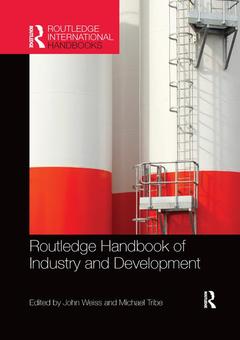Routledge Handbook of Industry and Development Routledge International Handbooks Series
Coordonnateurs : Weiss John, Tribe Michael

The Routledge Handbook of Industry and Development is a global overview of industrialisation. Each chapter will provide readers with contemporary insights into this this essential aspect of economic development.
Industrialisation has been at the forefront of discussion on economic development since the earliest days of development economics. But over the last fifty years, the manufacturing sectors of different countries and regions have grown at strikingly different rates. In 1960 developing countries took a very small share of global manufacturing production. Today the position had changed radically with fast growth of manufacturing in many parts of what was originally the developing world, particularly in China and the rest of East Asia. On the other hand, countries in Africa and parts of Latin America have been largely left behind by this process of industrialisation. This volume aims to illuminate this uneven development and takes stock of the current issues that hinder and support industrialisation in low and middle income economies.
This Handbook is a collection of chapters on different aspects of industrialisation experience in a range of countries. Key themes include, the role of manufacturing in growth, the nature of structural change at different stages of development, the role of manufacturing in employment creation, alternative options for trade and industrial policy, the key role of technology and technical change, and the impact of globalisation and the spread of global value chains and foreign direct investment on prospects for industrialisation. Several chapters discuss individual country experiences with examples from India, Mexico, South Africa and Tanzania, as well as an overview of African industrialisation.
This authoritative Handbook will be a key reference source for those studying or wishing to understand contemporary economic development. Offering inspiration and direction for future research
- Editorial Introduction 2. Manufacturing as an Engine of Growth 3. Patterns of Structural Change and Manufacturing Development 4. Patterns of Structural Change in Developing Countries 5. Industry, Employment and Poverty 6. Deindustrialisation: An Issue for both Developed and Developing Countries 7. What Role for Small Enterprises? Industrial Clusters, Industrial Policy and Poverty Reduction 8. Industrial Policy: Back on the Agenda 9. Import Substituting Industrialisation (ISI): Can or Should We Divorce Industrialisation and Trade Strategies? 10.New Directions of Foreign Direct Investment and Industrial Development 11. Global Value Chains in Manufacturing Industry: Where they came from, Where they are going and Why this is important 12. Electronics and Global Value Chains 13.Global Value Chains in Apparel: Still a Path for Industrial Development? 14. The Role of Special Economic Zones in Manufacturing Development in sub-Saharan Africa: Structural Transformation and Employment Creation 15. International Competitiveness in Manufacturing and the China effect 16. Is the choice of technique debate still relevant? 17. Technological Learning in Developing Counties 18. Mexico’s New Industrial Organisation since the 1980s: Glocal Challenges from Export-orientation and Polarisation 19. Industrial development in India 20. Is there an Africa problem? 21. Industrial development in Tanzania 22. Manufacturing in Post-Apartheid South Africa: Performance and Policy
John Weiss is Emeritus Professor of Development Economics, University of Bradford, UK.
Michael Tribe is Honorary Lecturer, Department of Economics, University of Strathclyde, UK.
Date de parution : 12-2019
17.4x24.6 cm
Date de parution : 09-2015
17.4x24.6 cm
Thèmes de Routledge Handbook of Industry and Development :
Mots-clés :
Te Ch; Average Annual Labour Productivity Growth; Tamil Nadu; Knowledge Spillover; GVC Concept; Gdp Growth; EPZ Employment; UK Cabinet Office; Mexico’s Manufacturing Sector; FDI Flow; South African Manufacturing; Private Sector Development; Global Lead Firms; Lead Firms; EOI; Mexico’s Manufacturing; Gdp Ratio; HTS; Micro Enterprises; IPAP; Technical Choice; GVC Literature; South African Reserve Bank; Manufacturing Growth; Technological Learning



